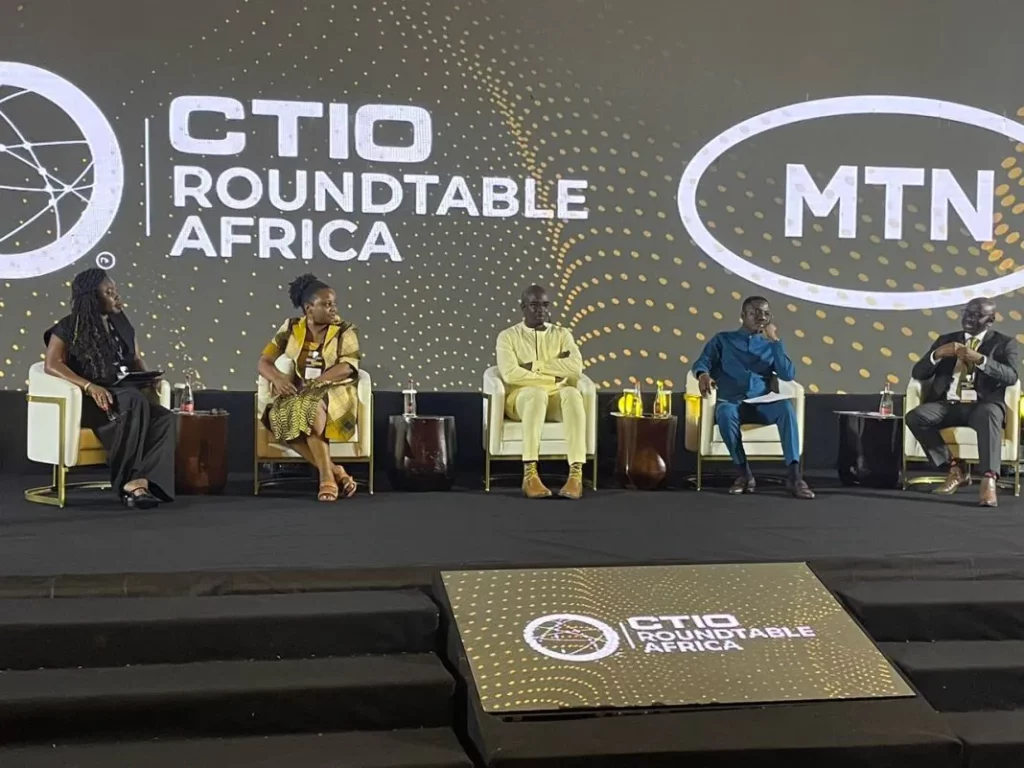The MTN Business CTIO Roundtable Africa 2025 was held in Accra under the theme “Transforming Business Strategies and Operational Efficiency.”
The high-level forum gathered top technology executives, innovators, policy advisors, and business leaders from across the continent and beyond to explore the growing role of artificial intelligence (AI) in Africa’s digital transformation journey.
Angela Mensah-Poku, Chief Enterprise Business Officer at MTN Ghana, opened the event by emphasising the importance of moving beyond discussions and into meaningful application.
She explained that while last year’s forum focused on AI use cases, this year’s edition was centred on real-world implementation and deliberate action.
Angela Mensah-Poku highlighted how AI has permeated everyday life, even becoming a topic at social events like weddings and christenings.
She called on stakeholders to focus on creating AI solutions that are not only innovative but also locally relevant to African businesses and communities.
Bernard Acquah, Chief Information Officer of MTN Ghana, reinforced this call for action by urging African businesses to fully integrate AI into their strategies.
He stressed that artificial intelligence is not just a futuristic concept but a present-day tool that must be embedded in business operations to remain competitive.
Mr. Acquah explained that AI could contribute trillions of dollars to the global economy, but the real value lies in solving specific, high-impact problems.
He advised businesses to begin with small, targeted AI projects that can be scaled up based on success. Drawing from global examples, he noted how BMW had successfully reduced visual inspection errors by 18 per cent through AI integration.
Bernard Acquah encouraged firms to bypass outdated legacy systems by adopting mobile-first technologies, especially in sectors like finance where infrastructure challenges persist.
He pointed out that AI can streamline operations, eliminate manual bottlenecks, and increase overall efficiency.
Acquah was keen to emphasise that AI should be seen as a tool to augment human potential rather than replace it. Citing Morgan Stanley’s use of an AI assistant that helps financial advisors cut research time by up to 90 per cent, he underscored the value of smart, supportive technologies in enhancing productivity.
He also drew attention to the need for quality data, stating that “smart algorithms demand smart data.” According to him, data integrity must be a top priority for any successful AI initiative.
Talent development was another key focus of his presentation. With millions of young Africans expected to enter the workforce by 2030, Acquah stressed the urgency of digital education. Training in data analytics, machine learning, and AI would be critical in preparing Africa’s youth for the rapidly evolving job market.
He concluded with a reminder that ethical leadership would be essential in the responsible adoption of AI technologies.
The Chief Information Officer of GCB Bank, Abel Lomotey Daitey, echoed these sentiments. He urged businesses to stop treating emerging technologies like AI, blockchain, and cloud computing as optional or experimental.
According to Daitey, these are now core elements of modern business strategy. He noted that AI and data analytics enable companies to deliver hyper-personalised customer experiences that can significantly boost satisfaction and loyalty.
Daitey highlighted the growing relevance of blockchain, especially in the context of central bank digital currencies like Ghana’s eCedi. While regulators continue to exercise caution, younger demographics are already active participants in crypto markets, necessitating proactive adaptation.
He also emphasised the role of cloud computing and advised institutions to begin preparing for cloud transitions to avoid being left behind.
In sharing a personal anecdote, Daitey recounted how a young staff member used AI to solve a complex problem more effectively than a panel of experts. This, he said, illustrated the need for a new mindset—one that is goal-orientated, adaptable, and technologically skilled.
Dr. Stephane Nwolley, CEO of Npontu Technologies, focused on the importance of developing AI solutions that are locally built and culturally aware.
He warned against the use of imported AI models that may not reflect Africa’s unique social and infrastructural challenges. For instance, he pointed to inconsistencies in civil registration systems and asked how AI could be used to restore public trust in digital identity frameworks.
Npontu is working with governments and businesses to create AI-powered solutions tailored to local needs. These include educational tools like the Small Later Learner, which adapts to each student’s individual learning style, and conversational AI systems designed for informal businesses.
Dr Nwolley emphasised that his company’s products are developed in line with ethical standards, cultural values, and data privacy regulations comparable to Europe’s General Data Protection Regulation (GDPR). For him, building technology is also about building trust.
Google’s Programme Manager for AI in Africa, Abdoulaye Diack, concluded the roundtable by stressing the need for investment in infrastructure and local talent. Reflecting on his early collaboration with MTN, he praised the company’s foresight in embracing mobile technologies. Diack pointed to tools like Google Colab that allow for offline model development and described this trend as part of an “open-school AI revolution”.
He welcomed recent infrastructure projects such as undersea fibre-optic cables and the establishment of a Google Cloud region in South Africa, which are helping African developers access world-class platforms. Diack also announced a pan-African AI and machine learning conference to be hosted in Ghana later this year. He emphasised that with the right focus on data, infrastructure, and human capital, Africa could not only catch up but lead in digital innovation.
The 2025 MTN Business CTIO Roundtable concluded with a unified call to action: African governments, businesses, and innovators must work together to adopt and adapt AI technologies in a way that is ethical, inclusive, and impactful. The message was clear—Africa’s digital future is within reach, but it requires intentional collaboration, local investment, and bold leadership today.

